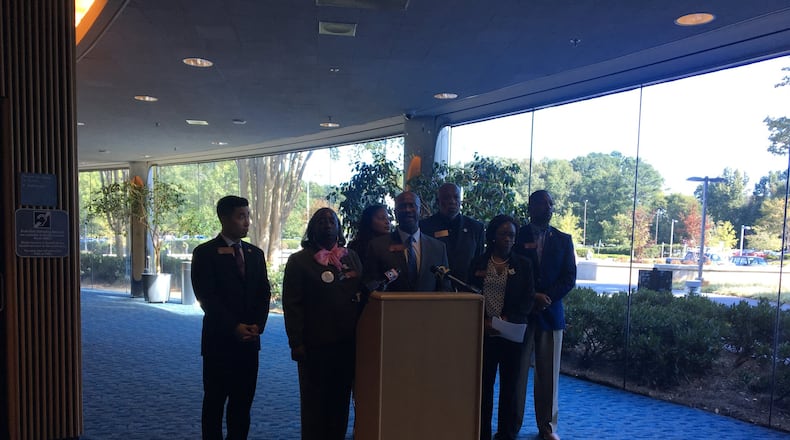Georgia’s most diverse county is also the one most engaged in voter suppression, members of the Georgia Legislative Black Caucus charged Thursday.
As Gwinnett voters increasingly embrace the Democratic Party, non-white residents are facing more challenges as they try to vote, seven Democratic members of the caucus said at a press conference at the Gwinnett Justice and Administration Center.
Through Sunday, Gwinnett County had rejected about 8.5 percent of mail-in absentee ballots, an Atlanta Journal-Constitution analysis found earlier this week. Across Georgia, less than 2 percent had been rejected.
Gwinnett’s 390 rejected ballots accounted for about 37 percent of the total rejected ballots statewide.
County officials have denied any wrongdoing, saying they are following state law.
Gwinnett residents “don’t represent 37 percent of the state” said state Rep. Dewey McClain, a Caucus member who lives in Lilburn. “We represent 9 percent. That should not happen, that a county representing 9 percent of the state makes up 37 percent of the rejected ballots.”
The registrations of more than 53,000 potential voters across the state are also in limbo due to Georgia's "exact match" law, requiring voter registration information to match that on driver's licenses, Social Security cards or state ID cards. Caucus members said that, too, is suppressing the vote of non-white Georgia residents. Of those 53,000 pending registrations, about 80 percent represent African Americans, Asian-Americans and Latinos, according to a federal lawsuit challenging exact match.
By Monday night, voting and civil rights groups had zeroed in on Gwinnett.
At least two federal lawsuits were filed against Secretary of State Brian Kemp and the Gwinnett elections board — one on behalf of the Coalition for Good Governance and the other by the American Civil Liberties Union. They ask, among other things, that rejected absentee ballots be reviewed and would-be voters be given a chance to rectify the situation.
A separate letter sent to Gwinnett by the Lawyers’ Committee for Civil Rights Under Law also expressed concerns. It, too, homed in on alleged racial disparities in the ballot rejections.
According to the group’s analysis, about 2.5 percent of absentee ballots submitted by voters who identified as white had been rejected.
That was less frequent than the rejection rates for Asian (14.8 percent), black (8 percent) and Hispanic voters (4.3 percent). Just more than 9 percent of voters whose race were unknown had their absentee ballots rejected.
“Intent is always a difficult thing to prove, but we’ve seen a disproportionate impact on people of color,” said Rep. Sam Park, a Gwinnett County Democrat. “It requires further investigation.”
Rep. William Boddie, a South Fulton County Democrat, backed away from the notion that Gwinnett County is intentionally suppressing the non-white vote, but said the state’s absentee ballot procedures give county election boards too much discretion.
“Gwinnett County is abusing that discretion,” Boddie said.
While not always the case, studies and polls have shown that minority voters are more likely to vote for Democrats than Republicans.
McClain called for new county leadership, noting that Gwinnett’s Board of Commissioners and school board are both all-white and all-Republican.
Hillary Clinton won Gwinnett during the 2016 presidential election, the first time the county had chosen a Democrat since Jimmy Carter in 1976.
Voters in Gwinnett also could play an important role in the race for Georgia governor. An AJC analysis found that Gwinnett saw the state's largest jump in Democratic participation between the 2010 and 2018 gubernatorial primaries.
In addition, Democrats appear poised to challenge this November for a number of Gwinnett-based legislative seats that have long been held by Republicans. The county’s overall legislative delegation — currently comprised of 15 Republicans and 10 Democrats — has a chance to flip.
Keep Reading
The Latest
Featured


